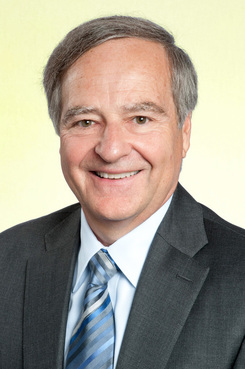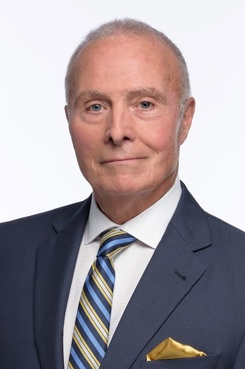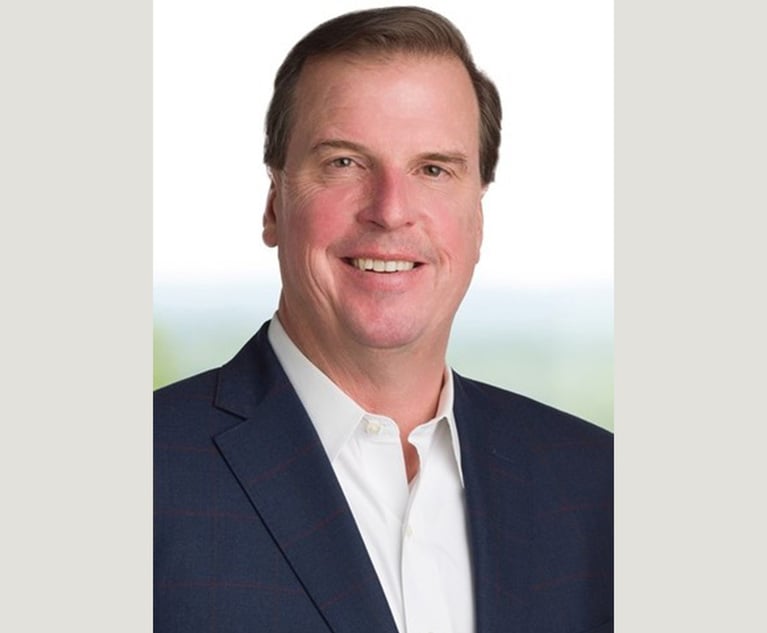Law Firm GC a Role for the Seasoned, but That Means Grooming a Successor
To fill the role of general counsel, law firms typically look for someone with the years of experience needed to confront difficult and potentially costly issues in an unflinching way.
February 21, 2018 at 04:23 AM
6 minute read
 Joseph Bottitta.
Joseph Bottitta. To fill the role of general counsel, law firms typically look for someone with the years of experience needed to confront difficult and potentially costly issues in an unflinching way.
Firm GCs talk of open-door policies and around-the-clock availability—even, for many, while simultaneously trying to build or maintain law practices of their own. It's a position that's often occupied by someone who has been doing it for decades, or who otherwise has a wealth of experience and training, which makes sense, but then that raises the issue of finding a replacement.
Keeping that seat filled is vital, as it seems law firms' need for devoted in-house counsel is as significant as ever.
“The big firms understand they need it. … The smaller firms and the solos really need it, but they can't afford it,” said Joseph Bottitta, ethics counsel at Genova Burns. “It's the great middle that should pay more attention to it than I think they do.”
Frank Ciuffani of Wilentz, Goldman & Spitzer in Woodbridge, for 17 years a Superior Court judge, returned in April 2017 to the firm, where he had practiced for decades prior to joining the bench. He was named GC in early 2018, replacing Ellen Torregrossa-O'Connor, who herself was appointed to the Superior Court.
The 600- to 700-hour per year role is not one that Ciuffani, soon to be 71, will keep for years on end.
 Frank Ciuffani.
Frank Ciuffani. “We did not have a GC when I left” the firm in 2008, and “the managing partner essentially served in that role,” said, Ciuffani, who is also in the process of building an ADR practice.
Ciuffani added that his experience as a judge—particularly a chancery judge—suited him to the GC role.
“I was [a] general equity judge, so my decisions were my decisions. … I think they [firm management] knew I had pretty good judgment. … And I had the time to devote to the task,” Ciuffani said.
Another Wilentz Goldman attorney, litigator John Hogan, was appointed assistant GC and is being groomed to take over for Ciuffani. “I'm kind of the bridge,” Ciuffani said. “They're not looking at me serving in this capacity for a decade.”
William Grand of Greenbaum Rowe Smith & Davis has been loss prevention and ethics counsel to the 93-lawyer firm, based in Iselin, for 35 years, and became designated firm GC in the mid-2000s. There, too, an assistant general counsel has been chosen: litigation partner Alan Naar, who was selected within the past year.
That's partly because of the volume of work. Sometimes Grand's complex commercial litigation practice picks up and leaves less time for the GC duties. But it's also so that someone else learns the role.
And it appears there's a fair amount to learn. At one time, firms treated familiarity with ethics rules as each attorney's individual responsibility, but now it's treated as a firmwide effort, according to Grand. Just keeping abreast of ethics rules is itself loss prevention, he said. Grand said of any given lawyer at the firm: “He's making business decisions. He's making decisions for the benefit of the clients. But I want ethics to be right up there.”
Grand organizes internal seminars on the New Jersey Rules of Professional Conduct and other topics. The substance of the issues is often technology-related, i.e.: “What will become the standard of care for wiring funds from our trust account? … Is it enough to follow the instructions in an email?” Also, when leaving and returning to the country, should lawyers leave behind firm devices in case customs agents attempt to seize a device containing client info? “Some of these things—there aren't clear answers yet,” Grand said.
Grand lets attorneys know he's always available, even while on vacation, and usually responds the same day, he said. Inquiries come almost every day.
“If people called me and it took me a week to get back to them, they'd stop calling,” Grand said. “It would be an afterthought.”
At 68-lawyer Newark-based law firm Genova Burns there is no designated GC, at least not nominally, but for Bottitta the position of ethics counsel is a full-time one. Bottitta, 69, a former president of the New Jersey state and Essex County bar associations who managed New Jersey Lawyer Services for a dozen years, joined Genova Burns in mid-2013 as of counsel. He assists with some litigation, ADR and estate matters, but has no billing requirement and no full practice, he said.
“That's the key to being ethics counsel—the availability,” Bottitta said. “That's why I don't know if you can do it on a part-time basis.”
In order to line up potential replacements, Bottitta has “taken a few people and kind of whispered in their ear,” he said. One way he's done that is organizing, with the help of employment law associate Allison Benz and others, seminars on social media and document metadata.
For the attorney who eventually replaces Bottitta as ethics counsel, the substantive issues are many, including changes to the RPCs. Another issue that's come up of late, according to Bottitta, is whether various arbitration rules permit multijurisdictional practice. In addition to keeping abreast of such issues, Bottitta is copied on every new file that's opened at the firm, and reviews the engagements for conflicts. A relationship between an existing client and anyone averse to the potential client's action, even if it's through a subcontractor, could preclude the engagement, though lawyers have gotten better at looking for those issues at the outset, Bottitta said.
On the rare occasion a new client engagement must be turned down, the ethics counsel is “literally taking money out of somebody's pocket,” Bottitta said.
“It can be an expensive proposition,” he added. “Sometimes you have to tell them 'no.'”
That's a difficult discussion to have, but the message from management is clear, he said: “You make the call.”
This content has been archived. It is available through our partners, LexisNexis® and Bloomberg Law.
To view this content, please continue to their sites.
Not a Lexis Subscriber?
Subscribe Now
Not a Bloomberg Law Subscriber?
Subscribe Now
NOT FOR REPRINT
© 2025 ALM Global, LLC, All Rights Reserved. Request academic re-use from www.copyright.com. All other uses, submit a request to [email protected]. For more information visit Asset & Logo Licensing.
You Might Like
View All

Election Law Spending Is on the Rise, but Big Firms Have Reasons Not to Cash In
6 minute read
Troutman Pepper Accused of Inattentive Case Management in $59M Malpractice Suit
7 minute readTrending Stories
- 1Exploring the Opportunities and Risks for Generative AI and Corporate Databases: An Introduction
- 2Farella Elevates First Female Firmwide Managing Partners
- 3Family Court 2024 Roundup: Part I
- 4In-House Lawyers Are Focused on Employment and Cybersecurity Disputes, But Looking Out for Conflict Over AI
- 5A Simple 'Trial Lawyer' Goes to the Supreme Court
Who Got The Work
J. Brugh Lower of Gibbons has entered an appearance for industrial equipment supplier Devco Corporation in a pending trademark infringement lawsuit. The suit, accusing the defendant of selling knock-off Graco products, was filed Dec. 18 in New Jersey District Court by Rivkin Radler on behalf of Graco Inc. and Graco Minnesota. The case, assigned to U.S. District Judge Zahid N. Quraishi, is 3:24-cv-11294, Graco Inc. et al v. Devco Corporation.
Who Got The Work
Rebecca Maller-Stein and Kent A. Yalowitz of Arnold & Porter Kaye Scholer have entered their appearances for Hanaco Venture Capital and its executives, Lior Prosor and David Frankel, in a pending securities lawsuit. The action, filed on Dec. 24 in New York Southern District Court by Zell, Aron & Co. on behalf of Goldeneye Advisors, accuses the defendants of negligently and fraudulently managing the plaintiff's $1 million investment. The case, assigned to U.S. District Judge Vernon S. Broderick, is 1:24-cv-09918, Goldeneye Advisors, LLC v. Hanaco Venture Capital, Ltd. et al.
Who Got The Work
Attorneys from A&O Shearman has stepped in as defense counsel for Toronto-Dominion Bank and other defendants in a pending securities class action. The suit, filed Dec. 11 in New York Southern District Court by Bleichmar Fonti & Auld, accuses the defendants of concealing the bank's 'pervasive' deficiencies in regards to its compliance with the Bank Secrecy Act and the quality of its anti-money laundering controls. The case, assigned to U.S. District Judge Arun Subramanian, is 1:24-cv-09445, Gonzalez v. The Toronto-Dominion Bank et al.
Who Got The Work
Crown Castle International, a Pennsylvania company providing shared communications infrastructure, has turned to Luke D. Wolf of Gordon Rees Scully Mansukhani to fend off a pending breach-of-contract lawsuit. The court action, filed Nov. 25 in Michigan Eastern District Court by Hooper Hathaway PC on behalf of The Town Residences LLC, accuses Crown Castle of failing to transfer approximately $30,000 in utility payments from T-Mobile in breach of a roof-top lease and assignment agreement. The case, assigned to U.S. District Judge Susan K. Declercq, is 2:24-cv-13131, The Town Residences LLC v. T-Mobile US, Inc. et al.
Who Got The Work
Wilfred P. Coronato and Daniel M. Schwartz of McCarter & English have stepped in as defense counsel to Electrolux Home Products Inc. in a pending product liability lawsuit. The court action, filed Nov. 26 in New York Eastern District Court by Poulos Lopiccolo PC and Nagel Rice LLP on behalf of David Stern, alleges that the defendant's refrigerators’ drawers and shelving repeatedly break and fall apart within months after purchase. The case, assigned to U.S. District Judge Joan M. Azrack, is 2:24-cv-08204, Stern v. Electrolux Home Products, Inc.
Featured Firms
Law Offices of Gary Martin Hays & Associates, P.C.
(470) 294-1674
Law Offices of Mark E. Salomone
(857) 444-6468
Smith & Hassler
(713) 739-1250







